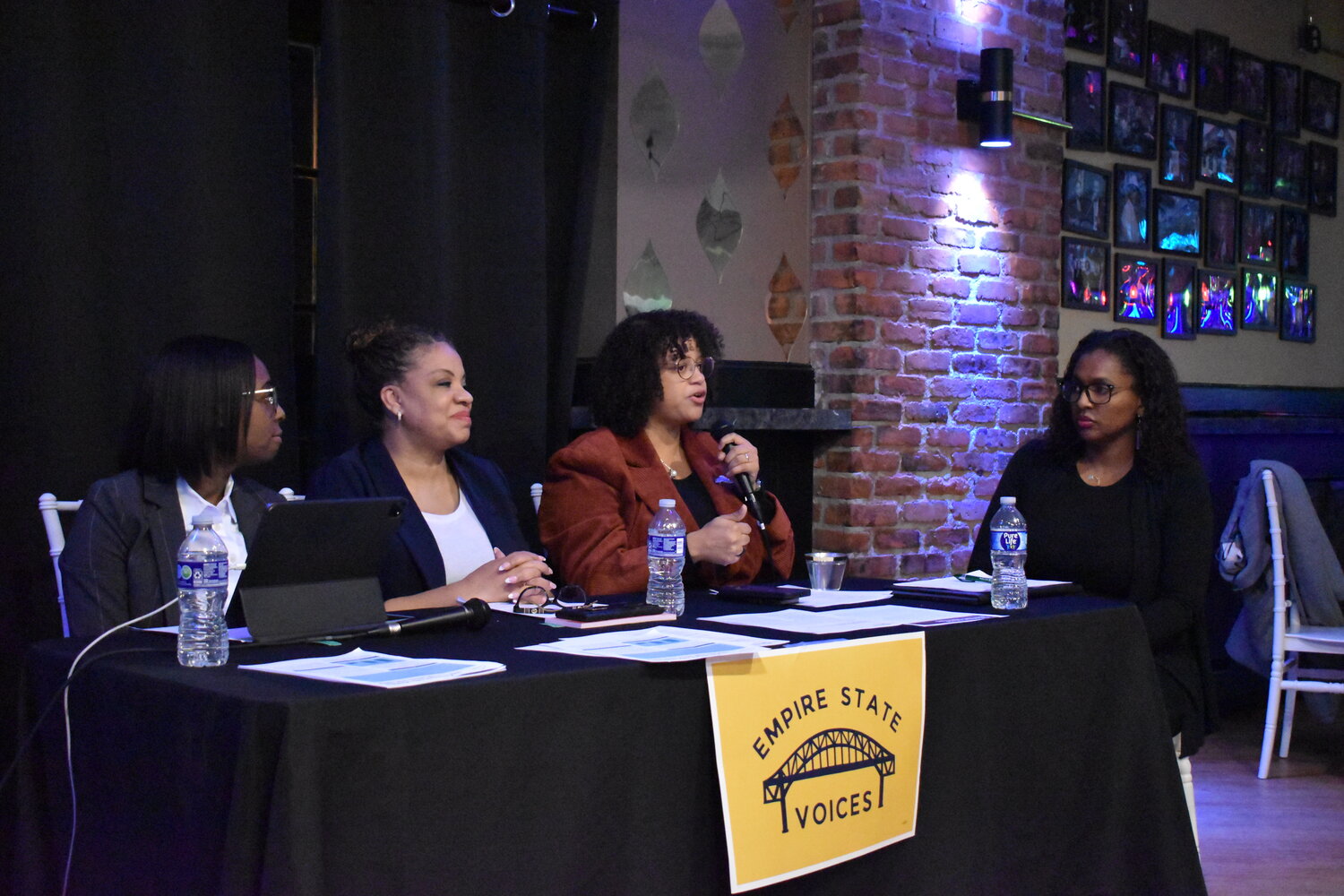Exploring the intersection of race and economics on Long Island
Since the earliest chapters of its history, the United States has left its share of scars on the country’s social and economic landscape, to say the least.
Now, with a legacy of slavery, Jim Crow and persistent discrimination, shadows of past injustices continue to echo in disparities across employment and housing opportunities, and access to quality education, health care, and other important resources.
On Feb. 29, Empire State Voices and Economic Security Project, two organizations dedicated to fighting for economic policies that benefit those who have historically been underrepresented and often neglected, hosted a forum in Elmont focusing on the intersection of race and economics, and how it affects communities, like Uniondale, all over Long Island.
“The economic impact of the disparities that exist are hitting Black people straight,” Assemblywoman Michaelle Solages, who took part in a panel discussion, said. “We’re talking about food insecurity, we’re talking about housing instability, we’re talking about issues like economic empowerment. We are getting the brunt end of it, and we need to push back. We need to make sure that we are educated and galvanized.”
Residents from Elmont, Uniondale, Roosevelt, Hempstead and elsewhere gathered at Le Spot Cafe for in-depth conversations about the economic policies that most dramatically affect their communities, where progress has been made, and where there still remains important work to be done.
“We must stop with the isolation of neighborhoods and people,” said community activist Mimi Pierre Johnson, who recently organized a bus protest with riders from Uniondale, Roosevelt, Hempstead and Elmont. “Understanding the system, sharing with each other and coming together,” Pierre Johnson added, is the only way forward.
“We have to help each other,” she said. “When you begin to see human beings — the dignity of a person — that’s when real work begins.”
The evening began with a presentation on a new groundbreaking initiative — the IRS Direct File pilot program, a free tool being offered to New Yorkers for the first time this year to ease the burden and reduce the cost of filing taxes. This will be the first time many residents will be able to file their taxes at no cost.
The event transitioned into the panel discussion, which was moderated by policy expert Sherrise Palomino. The guest panelists included Solages, Pierre Johnson and economist Ludy Thenor-Shaw, who shed light on the complexities of economic policies and helped listeners understand the broader economic landscape.
All of the panelists spoke on the state of the “Black economy” on Long Island, the benefits of legislative victories such as the Inflation Reduction Act and the CHIPS Act, as well as the impact of the ongoing gridlock in Congress over government spending. Conversations also centered on the importance of civic and community engagement, as well as how New Yorkers of all colors and backgrounds can support the economic growth of Black communities.
“We had important conversations around ensuring that we create a pathway for economic opportunity in Black communities,” Solages said, “as well as what has and still needs to be happening across the state with regard to economic development and how we can tap into these opportunities for all New Yorkers.”
The panelists explored the challenges and opportunities in the Black economy, and delved into the benefits of recent legislation.
“We have seen important legislative steps taken in the past few years to direct funding and opportunities to these communities,” said Maria Martinez, executive director of Empire State Voices. “Tonight allows us to gather, organize, and ensure that these steps are only the beginning.
“But there is a lot of work that still needs to be done,” Martinez added, “to allow Black and Brown communities in New York to flourish.”
“A key component of building economic power for working people is transforming the systems that deliver relief,” said Adam Ruben, the Economic Security Project’s vice president of campaigns and political strategy, who took part in the panel discussion.
“In the Biden administration’s first term,” Ruben said, “the American Rescue Plan, the Inflation Reduction Act, and now the IRS’s Direct File free and simplified tax filing program have helped bring costs down and opened the door to returning more money to middle-class families. When corporations pay their fair share and when junk fees are eliminated, it means more resources are better dedicated to caring for our children and their communities — and here in New York, it means more families will easily access the federal Child Tax Credit and New York Working Families Tax Credit to help their children thrive.”

 44.0°,
Mostly Cloudy
44.0°,
Mostly Cloudy 




